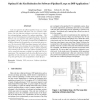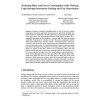66 search results - page 5 / 14 » On reducing misspeculations in a pipelined scheduler |
ICPP
2002
IEEE
14 years 11 days ago
2002
IEEE
Code size expansion of software-pipelined loops is a critical problem for DSP systems with strict code size constraint. Some ad-hoc code size reduction techniques were used to try...
IPPS
2000
IEEE
13 years 11 months ago
2000
IEEE
Many techniques for increasing the amount of instruction-level parallelism (ILP) put increased pressure on the registers inside a CPU. These techniques allow for more operations t...
CASES
2001
ACM
13 years 11 months ago
2001
ACM
In this paper we describe a design exploration methodology for clustered VLIW architectures. The central idea of this work is a set of three techniques aimed at reducing the cost ...
EUROPAR
2001
Springer
13 years 12 months ago
2001
Springer
Operand bypass logic might be one of the critical structures for future microprocessors to achieve high clock speed. The delay of the logic imposes the execution time budget to be ...
PACS
2004
Springer
14 years 23 days ago
2004
Springer
Dynamic instruction scheduling logic is one of the most critical components of modern superscalar microprocessors, both from the delay and power dissipation standpoints. The delay ...


